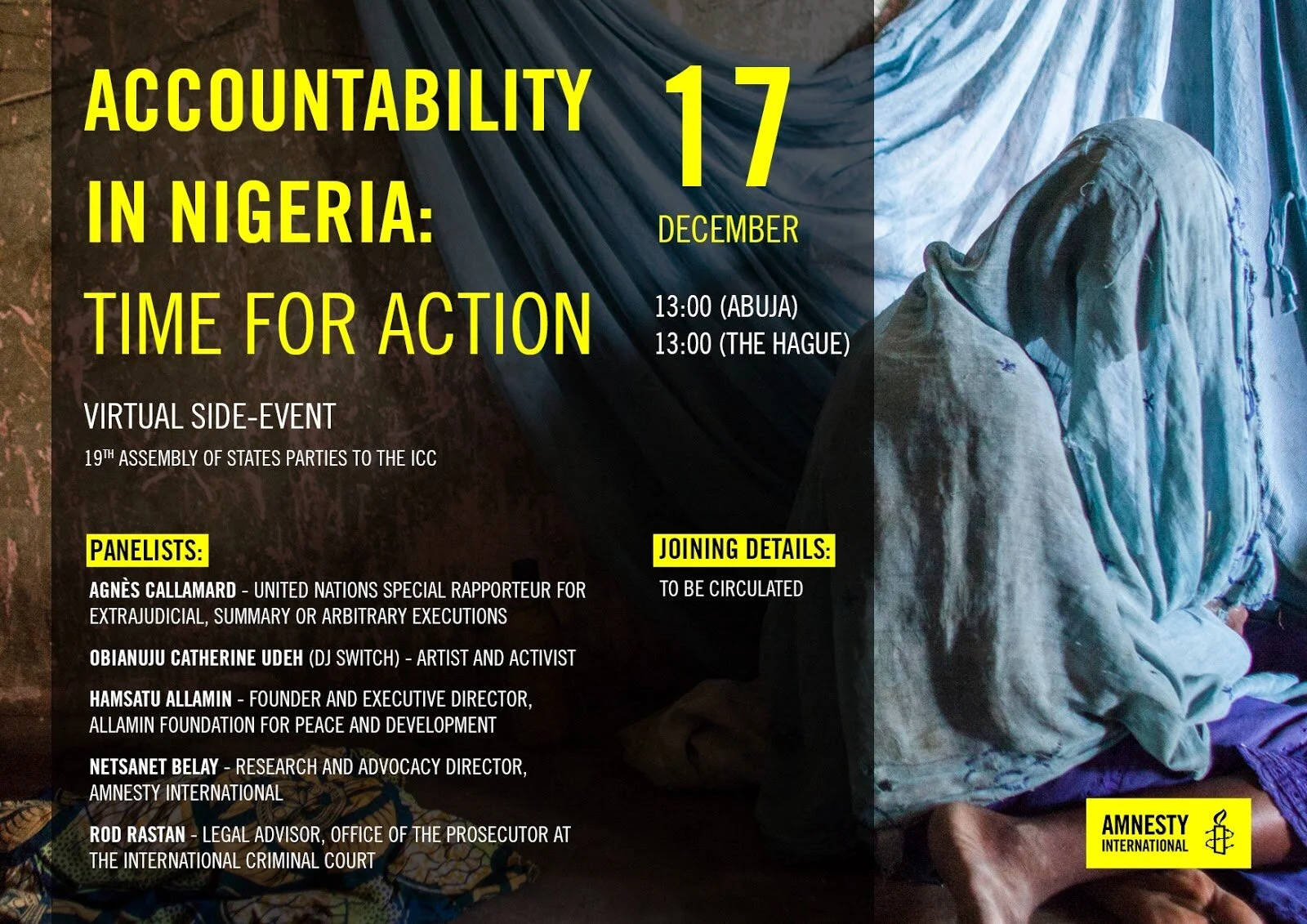19TH SESSION OF THE ASSEMBLY OF STATES PARTIES
17 December 2020
Name of the Side Event: Accountability in Nigeria: Time for Action (Hosted by Amnesty International)
Report by: Alexandrah Bakker, Junior Research Associate PILPG-NL
Highlights:
The Office of the Prosecutor (OTP) of the International Criminal Court recently announced the conclusion of its preliminary examination into the situation in Nigeria, with the statutory criteria for opening an investigation met.
The speakers welcomed the OTP’s decision, emphasizing that various actors continue to commit crimes with impunity throughout Nigeria.
Summary of the Event:
Ms. Samira Daoud, Regional Director for Amnesty International (AI) in West and Central Africa, opened the side event by noting its timeliness. On the one hand, the OTP announced the conclusion of its preliminary examination of the situation in Nigeria, and on the other, Boko Haram has claimed responsibility for the recent abduction of over 500 students in Katsina State, of which over 300 remain missing.
Mr. Netsanet Belay, Research and Advocacy Director for AI, welcomed the OTP’s conclusion of its preliminary examination as a major milestone in the struggle for accountability in Nigeria. Nonetheless, he noted that this is not enough: the OTP must urgently seek permission to open an investigation, and this investigation must begin as soon as possible while action is taken on evidence preservation, witness protection, and outreach to victims in Nigeria. Mr. Belay gave three reasons for the continued urgent need for accountability. First, crimes continue to be committed, with no end in sight, by both Boko Haram and Nigerian security forces. Second, Mr. Belay sees no promising prospects for prosecution of perpetrators of those crimes from within the Nigerian government. He noted that while there have been countless inquiries, these have not been designed or conducted with a view to facilitating prosecutions and their findings have never been made public. Third, Mr. Belay cautioned that further delays will sabotage the successful prosecution of crimes in the future, as delays will result in evidence and witness tampering. He finished by recognizing the challenges faced by the OTP from a lack of resources, but adding that he will not accept a situation in which the OTP declares that justice for victims in Nigeria is too expensive.
Ms. Hamsatu Allamin, an activist from North East Nigeria, described the situation in that region. She noted that the North East is the least developed part of the country, with education largely inaccessible and knowledge of human rights virtually non-existent. She added that both insurgents and counter-insurgency forces grant themselves absolute power and operate with impunity, indiscriminately murdering citizens and abducting young girls into sexual slavery. Ms. Allamin observed excitement in Nigeria about the ICC’s progress in the situation, noting that impunity has become the norm in the North East.
Ms. Agnes Callamard, UN Special Rapporteur for Extrajudicial, Summary or Arbitrary Executions, agreed with previous comments on the extent of impunity in Nigeria. She reflected on her own experiences in Nigeria, when the Nigerian authorities did not respond to her with aggression but simply failed to engage in a meaningful dialogue with her over her findings. She described the situation in the entire country as an “injustice pressure cooker,” with injustices simmering in many localized conflicts as well as on a national level due to widespread insecurity. Within this context, she found a high level of resentment and grievance, most of which is expressed through “toxic ethnoreligious narratives,” or, in counterterrorism terminology, “extremist ideologies.” Four broader contextual factors added to her worries: a nationwide population increase, the increased rate of extreme poverty despite growth on the national level, increased environmental degradation and desertification, and the proliferation of small and military grade weapons. Ms. Callamard noted that the history of Nigeria and other comparable situations makes it clear that tackling human rights violations also requires addressing these broader contextual factors. Despite all this, Ms. Callamard was hopeful that recent instances of large-scale demonstrations in the End SARS movement, which were based neither on ethnicity nor religion but on a hope for a better Nigeria, show that it will be the young population of Nigeria who finally decides that “enough is enough.”
Mr. Rod Rastan, Legal Advisor at the OTP, explained that while the OTP quickly concluded that crimes within the Court’s jurisdiction had been committed in Nigeria, its decision to open an investigation was delayed as it tried to engage with the Nigerian authorities and encourage them to take action at the national level. He added that, moving forward, the OTP will continue to work in a collaborative spirit with Nigeria, while continuing to build its cases if the Nigerian authorities do not make progress. In response to Mr. Belay, he added that the OTP is already taking steps to identify opportunities for evidence preservation and operational planning, and is working on identifying issues in cooperation and security.
To conclude, Ms. Obianuju Catherine Udeh, an artist and activist better known as DJ Switch, described the plight of Nigerians. Ms. Obianuju Catherine Udeh noted that while it was hopeful to see Nigerians standing up for their country in the End SARS movement, they continue to face violence for doing so. She described the unprovoked use of force by Nigerian authorities against protestors at the Lekki toll gate, adding that this was not an isolated incident. She emphasized the irony of this violence when the constitution states that ensuring the security and welfare of the people is the primary purpose of the government. As such, she noted that the End SARS movement has transformed from a movement against police brutality into a movement against bad governance. She concluded by reflecting on a popular Nigerian saying according to which “the problems never end,” adding that this does not mean that the problems cannot be solved.

